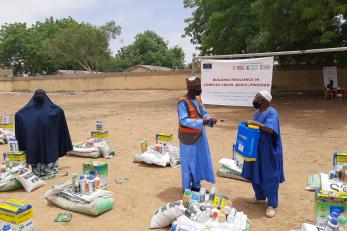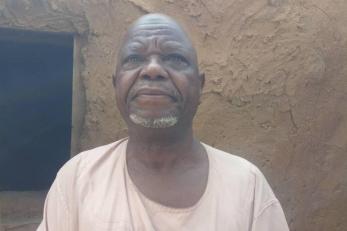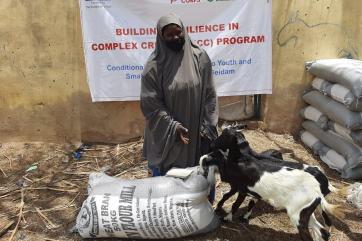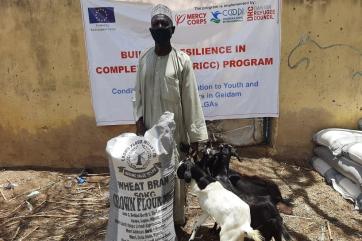Agricultural interventions reviving community livelihood and resilience

Food is central to human development and its production at a sustainable level must, therefore, be a priority of governments in all nations. In Northeastern Nigeria, several attempts have been made to address food and nutrition insecurity, and with the economic situation and the pandemic ravaging the world, a lot of people are currently struggling to survive, the EU Building Resilience in Complex Crisis (BRICC) program has been reaching out to local governments and communities in Yobe State to expand the knowledge of the residents on agricultural techniques and practices.
Livelihood activities implemented by Cooperazione Internazionale (COOPI) in Geidam LGA under the Mercy Corps Nigeria led EU BRICC Program have recorded numerous successes in the lives of the people in Geidam with about 1,920 farmers benefiting from the program.

Babura Mai Shago is a 55 year-old returnee who resides in the Kolori community, Geidam LGA of Yobe state. He was displaced from Geidam town as a result of the insurgency. Babura migrated to Gashu’a in Bade LGA with his wife and eight children (3 females and 5 males). While in the new environment, life became very difficult, worse than it was in Geidam. Babura and his family were rendered vulnerable, as the breadwinner of the family, he could no longer meet the basic needs of himself and the family. No food, no safe place to sleep, putting them at risk of infectious diseases, and no medical/health assistance. All these were Babura’s thoughts until he was offered assistance by the BRICC program.
A few years after he returned to Kolori to Geidam, he was elected by community members to represent them on matters of crop and livestock in a community base farmers planning in Lawan Kolori ward, Geidam Local Government. He joined the farmers group where he was selected as a beneficiary by the Agricultural Development Program of Yobe state under the BRICC agricultural component of the project which covers food security and livelihood. Babura received basic training on agricultural practices and animal fattening, where he devoted his time and has learned new techniques on farming practices through technical training.
In Babura’s words, “BRICC has enabled me to acquire in-depth knowledge of producing simple compost manure and modern farming practices. I can now cultivate crops and rear animals at the same time using minimal capital. This has improved my livelihood and also brings about a source of income to me.”
Babura now has an established farm in Ashekri community, the farm measures about 1.5 hectares. He has done land preparation under the guidance of COOPI’s BRICC supported Agronomist and Agricultural Development Program (ADP) extension worker, farm input was prepared for Babura by the BRICC project team. Babura is ready to cultivate his crop for commercial purposes, with extras he is hoping to use to sustain his family. “With the knowledge and training I received from BRICC Project, I will also diversify and embark into irrigation and cash crop production” expresses Babura.
He met the criteria to benefit from the BRICC conditional cash transfer input subsidy. The BRICC agricultural capacity building and input subsidy supports have improved his capacity to sustain and provide for his family’s basic needs even in the complex crisis community.
Babura finally said, “BRICC intervention has restored my hope and strength to take farming as a means of livelihood and I hope BRICC agricultural support will continue to improve food security on a global level.”
Other beneficiaries receiving their livestock and feedings


The BRICC program will continue in their efforts to tackle poverty, improve livelihood and provide capacity building to support communities to enhance their food security by leveraging new practices and techniques in implementing interventions across Northern Nigeria, with support from COOPI.
About BRICC
Building Resilience in Complex Crisis (BRICC) is a European Union funded program implemented jointly by Mercy Corps, Danish Refugee Council (DRC) and Cooperazione Internazionale (COOPI). The program aims to build the adaptive resilience capacities of 26,875 households (6,719 men, 6,719 women, 6,719 male youth, and 6,718 female youth) identified as vulnerable members of 30 target communities in six LGAs (Damaturu, Potiskum, Geidam, Yunusari, Gujuba and Gulani) of Yobe State by increasing their ability to cope with the shocks and the stresses of conflict, climate change and complex crisis, and their ability to transform the underlying causal dynamics to reduce the risk of future conflict for a period of three years (April 2019 – April 2022). In addition, six vocational skills centers, financial institutions, government actors, 30 community resilience groups (CRG), 600 community leaders, 248 savings and loan groups, 248 farmer’s associations, and two local civil society organizations will benefit from the action.